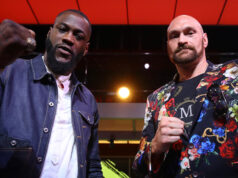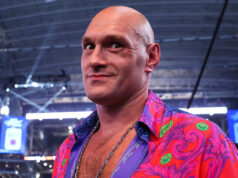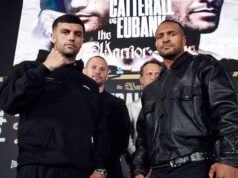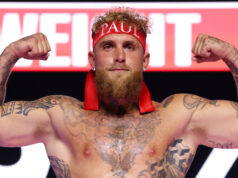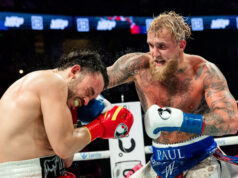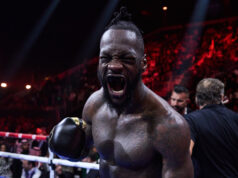The last few weeks has seen swirling controversy over the possible inclusion of professional boxers in the Olympic games, beginning with Brazil in 2016. Not only is there controversy about whether or not this should happen, there’s also controversy about just who these pro boxers could be, and how they could be affiliated. Below, find two different sides of the story. The first is from the AIBA itself, and the second contains arguments and quotes from both the WBC and promoter Gary Shaw.
The International Boxing Association (AIBA) strongly defends its position and images tarnished by non-AIBA pro boxing organizations in regard to the Olympic Games.
As defined in Chapter 1, Point 6 of the Olympic Charter, the Olympic Games “are competitions between athletes in individual or team events and not between countries. They bring together all athletes selected by their respective National Olympic Committees (NOCs), whose entries have been accepted by the International Olympic Committee (IOC). They compete under the technical direction of the International Federations (IFs) concerned.”
This definition means that the IOC recognizes one IF in each sport and accepts all athletes and officials for the Olympic Games according to the rules and regulations of this IF being also the world governing body of this sport.
As everyone is aware, AIBA is the only world governing body of the sport of boxing recognized by the IOC and AIBA’s mission and role as the governing body of the sport of boxing and in the Olympic Movement are well stated in the Olympic Charter as:
“The mission and role of the IFs within the Olympic Movement are: to establish and enforce, in accordance with the Olympic spirit, the rules concerning the practice of their respective sports and to ensure their application; (…) to establish their criteria of eligibility for the competitions of the Olympic Games in conformity with the Olympic Charter, and to submit these to the IOC for approval.” (Olympic Charter – Chapter 3, Point 26).
Therefore, it is an absolutely unchanged fact that all Olympic athletes will have to follow the Olympic Qualifying Guidelines which should also be approved by the IOC once proposed by the IF.
Throughout the last decades, the Olympic Movement has gone through a number of changes in order to further spread the Olympic spirit across the globe. As a result, after the Seoul 1988 Olympic Games, the IOC decided that professional athletes could be eligible for the Olympic Games, subject to approval of the IFs. Until now, only professional boxers and wrestlers are not allowed to compete in the Olympic Games.
Following its reform process which started in 2007, AIBA set its mission as “governing the sport of boxing in all its forms worldwide“. Based on this mission, AIBA strongly committed itself to bring the sport of boxing to another level through positive development initiatives after AIBA received unanimous demands from all AIBA National Member Federations, boxers and officials. In addition, this was also the result of a demand from the public and commercial markets which really would like to see more transparent and life-long caring programs for boxers.
AIBA has transformed its rules and competitions based on three different tiers. The Amateur competitions now called AIBA Open Boxing (AOB), the Semi-Pro team competition called the World Series of Boxing (WSB) launched 4 years ago, then ultimately, AIBA has launched a real pro boxing individual competition called AIBA Pro Boxing (APB).
For the first time in history, the Individual Champions of the World Series of Boxing participated in the London 2012 Olympic Games. Now, as a step further from the WSB, APB will become the first and only individual ranking competition in the history of boxing allowing its pro boxers to compete whilst retaining their Olympic eligibility and maintaining their membership status in their National Federations. It represents a safe career plan for AIBA athletes, providing them with a transparent development path, with protection and financial stability.
AIBA came out with this proposal following a long and deep analysis of the current situation of the global boxing market. The main goal of this groundbreaking competition program is to protect boxers throughout their entire career, from grassroots to the pinnacle of their pro career. This is why, in order to be eligible for APB, boxers should remain within their National Federations and thus under the AIBA Family following the AIBA Technical Rules and APB Competition Rules.
The non-AIBA pro boxing organizations are currently accusing the above-mentioned Olympic Movement system. However, AIBA has already opened its doors to all boxers competing under the regulations of these organizations to join APB following the APB eligibility criteria. As APB will officially begin its competition next year, time is running out for these boxers for whom the window will be opened until the end of this year.
AIBA understands the dreams and hopes of current professional boxers to compete in the Olympic Games. However, we also hope that they will understand the time and efforts all AIBA boxers have given through their entire career. Certainly, they will not want to lose the opportunity and their status of being loyal members of the AIBA Family for many years.
Now… for the other side of the story….
Promoter Gary Shaw is standing behind Jose Sulaiman and the WBC’s stance against AIBA (International Amateur Boxing Association) and its ruling to have professional boxers at the Olympic Games.
“I would like to respectfully inform you that the WBC has expressed its opposition to the monopoly to be instituted at the Olympic Games, by a ruling of AIBA to have professional boxers at the Olympics, but exclusively with those that have signed for AIBA, no one else,” said Suliman.
“They have also publicly expressed that they will not allow in the future having promoters of professional boxing, sign Olympic fighters. They claim that professional promoters come to sign boxers using their Olympic medals to take them for their promotions to exploit them.” Suliman concluded.
“As a promoter in professional boxing, I’m disturbed by the ruling come forth by the AIBA and its decision to have professional boxers at the Olympics. All fighters who have come from the amateur ranks try to achieve the goal of becoming an Olympian to represent their respective country. That dream will now die with professional boxers being able to compete in the Olympics.” stated Shaw.
“It appears to me that the AIBA wants to have a strangle hold on the sport of boxing.” Shaw continued. “The AIBA has no right to exclude any professional boxing promoter from singing an Olympic fighter. We promoters go to great lengths and take enormous risks to promote our fighters in hopes they become stars in the sport. Olympic boxing should be solely for amateur competition and all fighters should have the right to pursue the professional career as they see fit, once their amateur career is over.”


